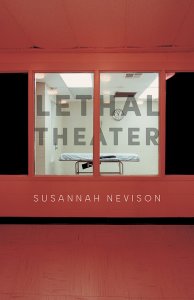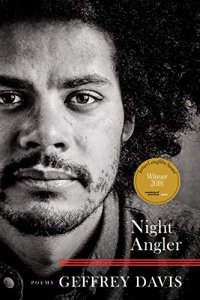Susannah Nevison, Melissa Stein, Geffrey Davis, G.C. Waldrep: Reviewed by Chelsea Wagenaar and Mark Wagenaar

Susan Nevison, Lethal Theater (Mad Creek Books)
Sharp in every sense of the word—exacting and ruthless, smart—Susannah Nevison’s second collection offers a bold critique of the American prison system.
In the opening poem, “Cell Watch: Strip Cell,” she writes, “But since this is the beginning / of the world, it’s up to you / to define the edges, contour / the known, to introduce the common / language: show him how this world / is nothing more than God’s hand / grenade spinning through the air.” The poem is full of quick sleights of hand: imagine incarceration as a reiteration of the God-breathed world, limited into language; imagine a “cell” not as a living thing prone to multiplication, but as a kind of tomb where someone waits for death; see “God’s hand” now enjambed to hold a weapon.
As in this first poem, the book repeatedly wields the second person perspective, which renders the reader complicit by means of passivity, ignorance, or agreement with a system shrouded in secrecy and the ability to strip humans of basic rights. But perhaps more insidiously, as the collection goes on, this makes the reader both witness and actor in this drama: you lead the imprisoned to his cell, you see the “bars lash light across his back,” you drape the sheet over the body, you find “the right vein.”
The collection is formally varied (she includes a series of “Parables”) and rigorously imaginative. Nevison juxtaposes the language of hunting for sport with that of incarcerating and executing humans; via metaphor, she reveals the needle as duplicitous agent: the thing that brings life and healing to one, death to another. Lethal Theater is a book for writer and reader, a riveting x-ray of who we really are.
—Chelsea Wagenaar

Melissa Stein, Terrible Blooms (Copper Canyon)
Many of the poems in Terrible Blooms are six to ten line poems in which animal or landscape give way to a sudden inscape within the speaker. These laser-cut jewels, however, never offer the objective correlative that one expects. “Never said” pivots from a damselfly in dew, which gives up a leg to live, to a speaker who says, plainly, “I simply said / in slanting evening light / I’d like to have a child.” “Groundhog Day,” for example, offers two: in one, the groundhog is described as “Fat joy splayed on its belly / eating everything green gives it,” which the unnamed speaker compares to a royal “we”: “We go around like this, / mowing up whatever we can / and in our own ways, drowning.” In the second section, the speaker offers a benediction of sorts, which is followed by a dark confession: “Let the groundhogs devour and burrow. / Let green sustain the mouths. / I can’t even control / my own starving.” “Peep” offers a suggestive backdrop, yet it’s peopled with desperation and loneliness: “Some feed the quarters in. / Some wheedle for / just a little more / for the quarters they’ve inserted.” The poem doesn’t offer judgment, however, but a radical empathy on the part of the speaker: “They say you get out / only what you put in. / What kind of alchemy is that? / I’d give my whole life / for another minute.” Her conclusion rings like a temple bell back through the poem and forward into the next one.
Brevity, surprise, and sharp turns are only three of Melissa Stein’s many gifts. Her poems are often fantastically detailed (“Bone-ache, hot. Steeped / muslin. Throat veiled / to pulp, such web, rhubarb / asphyxiate, something / delivered on a spoon / or in a net.”), yet her wild lyricism is dulled when the poem needs a plainspoken diction (“I’ll bite, you’ll snarl, we’ll part / for good. Let’s / leave. The wasps, / they’ll pick clean / what we wrought.”), and occasionally for ironic effect: “Lung” concludes with a short rhyming couplet, the sing-song rhyme a heartbreaking contrast to the discovery of a white spot on an x-ray. Stein also has an instinct for a disquieting surrealism; for example, in one poem a speaker turns into a swan in a post-office line, and offers to enfold the crowd and their “piglet grief.” In another, the speaker captains a vessel named confusion, then follows her faith into the water, sinks immediately, and is surrounded by fish, who marry her “to their kingdom” with their “o-mouths.” Another poem has the speaker telling her father that his antlers are growing again. Stein troubles the domestic, up-ends our expectations, and unsettles our comfort with inventive leaps and terrifying turns. She brings a dark, sometimes cynical humor to the page, yet one leavened both by the wisdom of the years, and by a heart that is, despite the pessimism, still vulnerable—a hard-won vulnerability, in a heart that one speaker admits is like a turnstile, one that “opens / madly and shuts just so.”
—Mark Wagenaar

Geffrey Davis, Night Angler (BOA Editions)
There is a river that winds through Geffrey Davis’ second collection, Night Angler. At times a physical river, at times a metaphor, and sometimes a repository of family and/or racial and/or mythic history (“so why then, while fishing shores of the Mississippi, do I feel and fear hooking a diaspora of drowned faces?”), it is a river that provides, and a river that destroys: “Today a flood, and you see the risk / in proximity, in life stretched by loving // both a river and the rain:—to watch what feeds you / run dangerous, the Biblical possibility / of nurture rising into a final rage. / Father rain. Mother river.” It is one the speaker of the poems returns to again and again not only to fish, but also to reflect upon his life, his desires, his faults, and his deepest longings. The river is time, and memory, and a mirror held up too, one that holds hidden currents, one that provokes the speaker to ponder his life, and his role in his son’s life.
Many of the poems in Night Angler are about Davis’ son—and this book, in itself, is a master class of how to write about those nearest you, how to risk and earn sentiment without being sentimental. Funny, moving, profound, “The Epistemology of Cheerios,” “Pillow Kombat with the Ultimate Sleep Fighter,” “Son’s Face,” and many others chronicle, in warm and precise detail, the foibles of new parenthood: “a sudden and enthusiastic and sunshiny geyser of urine / from my son’s penis startles me…” Davis is quick to admit his shortcomings—every parent has them!—and his honesty and intimacy, coupled with both the humor and the pain (“The first blood drawn I drew:— / clipped too close, the fragile bed / of the baby’s fingernail…I wept at so little loss…I mean / to say I discovered a sudden / window for my waiting, for paring prayers…”) of these moments, make them irresistible. The emotional range, for example, of “3:16 / World” is amazing: in a restaurant, a boy hollers that his father stinks, but after the initial embarrassment, the boy declares that his daddy stinks because he’s brown. This is a further layer to the book—his son is another link in the lineage of Davis’ family, a lineage that consists not only of DNA, but music (“…our belonging has always been / played in the key of desire // on instruments my father lifted / so well…”), addiction (“I hear father-addict / in the damn silence”), and pain (“what kind of wound make a man / set his favorite rooster // loose on a dying hen what make the man // snap the neck of that twice-broken bird / before his child’s eyes”). Yet Night Angler is also a reckoning of sorts too—an African-American man who is trying to brace himself for what his son will experience in a country that exhibits so many signs of systemic racism. In “Poem in Which My Son Wake Crying,” “his life matters” is repeated ten times; in other apostrophes and epistles, Davis exhorts his son to “…let your body // grow fragile… know the knot // of your desire…,” that he is “this kind of wonder in the dark…,” a “country of presence,” a sweetness and a grace.
—Mark Wagenaar

G.C Waldrep, feast gently (Tupelo Press)
G.C. Waldrep has such an extraordinary range, it’s difficult to characterize his work. Several poems in feast gently, such as the dizzying “Their Faces Shall Be as Flames,” which opens the collection, tie theological speculation to ecological concern, in a manner reminiscent of Mary Szybist; his syntax is as complex as Carl Phillips’; his associative movements turn as assuredly as Laura Kasichke’s; the sweep and range of his poems are as far-reaching as Jorie Graham’s; and he often engages, and develops, ideas that are rooted in philosophy, as one encounters in the work of Bruce Bond. And yet, as Joshua Corey wrote on the back cover, there is also “a holy dread that permeates these poems,” a longing for God that one rarely encounters in the often spiritually impoverished poetry of 21st century American. Chameleonic, he can also be political, as in “On the Seventh Anniversary of the U.S. Invasion of Afghanistan,” or in “Untitled (Drone Poem)” yet his poems are not the rants so common of the current political poem, but as associative as any of his other poems. In the former, he begins by speculating about the nature of the body, then turns to the metaphysical: “sometimes I think / we are all figures in a portrait / war is painting….” The poem then suddenly pivots: “If I say devotion is a candle / in the shape of a bell, you are already / six thousand miles away from the neighboring // place setting, a French forest / through which soldiers sight / my sister / bent low over thrust’s smoking flare.” What a marvelous sentence—the speed is astonishing, and the movement here is one characteristic of many of his poems. So, too, is the observation that follows, upon language itself: “Before language there was an idea / of language: to record / the empathy, the mirage, the attractions / of both change and surgery, / of body to bomb.” This penultimate turn ties the concerns of what has preceded it, while also opening another door to reflect upon language itself.
In associational twists and pivots—sometimes surreal ones—across theology, geology, ecology, philosophy, history, metaphysics, other alphabets, fairy tales, and cinematography, feast gently’s psalms, prayers, and songs draw from a remarkable hoard of knowledge—and yet, the poems are often funny, confessional, vulnerable, and generous with the people Waldrep encounters (Waldrep treats seriously and respectfully even people we might think of as on the fringe, whatever the fringe we may be: “When Christ arrived on the shores / of Lake Michigan, the people / knew Him, my neighbor insists…”), and in an era when American poets are assured of their own righteousness, Waldrep doubts his own. In the aforementioned “Their Faces Shall Be as Flames,” the speaker wonders if the disappearance of bees is “the true / rapture, was one true God after all a god of bees, and now she is taking / them home,” while this speaker eventually discloses that he has no lover, or child—the speaker is suddenly vulnerable, and the confessions seem to surprise him, the latter disclosure arriving through a simile, in which the bodies of bees rattle “like seeds in a gourd, / or like a child you’ll never have, that is, the possibility of that child, the rattling / blood of it, a different sort of vanishing…” As vertiginous as it can be to read poems that are multi-horizoned, and alchemic, and many-limbed and many-tongued, G.C. Waldrep’s feast gently never fails to be emotionally moving as well.
—Mark Wagenaar
Chelsea Wagenaar is the 2018 winner of the Michael Waters Prize for her second collection, The Spinning Place (forthcoming 2019 from Southern Indiana Review Press). Her first collection, Mercy Spurs the Bone, was selected by Philip Levine for the Levine Prize. She holds a Ph.D. from the University of North Texas and a B.A. from the University of Virginia. Her work appears recently or is forthcoming in Copper Nickel, Cave Wall, Poetry Northwest, and Southern Review. She is a visiting assistant professor in Humanities at Valparaiso University.
Mark Wagenaar is the author of three prize-winning poetry books, most recently Southern Tongues Leave Us Shining, selected by Afaa Weaver for the Red Hen Press Benjamin Saltman Prize. His fiction and poetry appear widely, including The New Yorker, Tin House, Southern Review, Gulf Coast, 32 Poems, Cincinnati Poetry Review, and River Styx, among many others. He is an assistant professor in English at Valparaiso University.